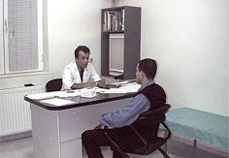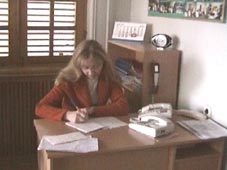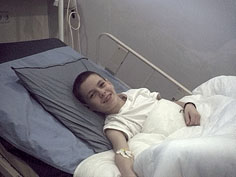
PROGRESS REPORT
of
THE GENESIS ASSOCIATION
for the period March 29th, 2002-September 29th, 2002

 |
PROGRESS REPORT of THE GENESIS ASSOCIATION for the period March 29th, 2002-September 29th, 2002
|
 |
|
To: Matthys Dolder,
Jorg Schwarzenbach,
Alfred Wyss,
Lions Club Basel,
Switzerland,
From: Maia Mgaloblishvili-Ryan Healthcare Programmes Director/President of the Genesis Association,Georgia Dear Friends, I hope this report will give you an impression of the developments at the Genesis Association for the last six months that have been made possible thanks to your generous donation which enabled us to purchase the office for Genesis and leave the Charity Clinic to operate in an autonomous space. If there is a need for more specific information on any issue, I will be glad to answer your questions.
|
|
| A short History
It took exactly three months from the moment when three members of the Lions’s Club of Basel: Matthys Dolder, Jorg Schwarzenbach and Alfred Wyss, donated the first installment for the purchase of the apartment - that is now the Genesis office - until the purchase was completed in June, 2002 (see the attached purchase documents). Genesis moved into it shortly afterwards (see below).
Technical issues needed to be solved:
The clinic also required additional expenditure, since moving the office created four additional rooms (two former office rooms, the old kitchen is now the ultrasound room, and another room was made for the laboratory by putting a glass and plastic partition in the hall), which required some exstra office and examination/medical tables, chairs, etc. A few items still need to be dealt with; we could not finish the kitchen in the office (which serve the clinic and the office), and we still need to arrange the meeting room better.
Developments at Genesis:
A: to have more room for effective consulting activities:


Newly created rooms for General Practitioners B. to create new necessary space for diagnostic activities:
There is enough space for all local staff now and for everybody who needs to visit us:
|
|

The Office Receptionist’s area in the big room |

The big room |
|
The Coordinator is in charge of the following Charity Healthcare Activities of Genesis: a) organisation of periodic medical site visits to the orphanages and shelters, when we invite a large group of consultant doctors to screen children’s health problems and than follow-up the identified problems in step by step health rehabilitation actions arranged within our clinic or at other medical institutions, when necessary; b) preparation of the visits to our clinic by groups of orphans or street children for medical investigations/treatment or for preventive/diagnostic measures (often asked by the orphanages/shelters); c) the admission, examination and co-ordination of investigations/treatment of those orphans/ street children with acute or chronic health problems who need a doctor at any time and, d) organises educational healthcare seminars for these children. Before the purchase of the office space she was sharing a room with a GP, often having to leave the room when the GP needed some privacy with his patient, and being unable to carry out her own job without permanent interference.
all financial operations are carried out there with enough space for the relevant documentation to be kept in an organised form;
Developments in Charity Activities during the reporting period:
It is important to note that during the summer months, a significant proportion of the children (those who are "social" orphans when the parents, often a single parent, can not feed them without an external help) living at the orphanages and shelters either return to their parents/guardians temporarily or these institutions move them to some summer sanatoriums, when possible (Genesis organised free of charge summer holidays for Akhalgori orphanage to Manglisi summer resort house this summer), so we have only been dealing with the so-called "hard-core" orphans and not-organised street children this summer. As you know, we work with three street children’s shelters (Child and Environment, House of Future, Satnoeba) and three orphanages (in Dighomi (partly), in Akhalgori and in Bodbe, east Georgia). This autumn we are expanding our activities to a fourth newly-established shelter in Tbilisi called Lampari and another orphanage in Aspindza in south Georgia near the Turkish and Armenian borders – the Ministry of Education, which is in charge of coordinating the problems of these institutions, asked us to help this orphanage as one of the worst orphanages on their list (I think you can imagine its condition already). We might re-establish our medical activities (carried out in the past with the help of Iris Bieder’s fund-raising) for Epileptic children at Kaspi Orphanage, if we manage to raise enough funds for it, since there are at least 20 children who need periodic investigations and uninterrupted treatment for Epilepsy which is very costly. For the autumn of 2002 Genesis will be providing regular healthcare aid to more than 600 children from the above mentioned orphanages, shelters and the day-care centre. The following case may not have a direct connection to a report on our progress. However, since it happened very soon after you left Georgia, and it is a good example for how many things we need to be prepared for – even if they are not within our "official" capacities – we take the liberty of including it here. 
About two weeks after you left we took a 13 years old orphan boy who lives in "The House of Future" (the shelter part of your group visited in Tbilisi) from the Central Burns Hospital to our clinic, under the responsibility of our GP/Surgeon. Both legs had severe third-degree burns that had been very inappropriately treated at the hospital – mainly because neither the hospital nor the shelter could provide the child with necessary consumables, medicines or appropriate hygienic conditions. Had he stayed where he was when our GP/surgeon was asked to give his opinion by the shelter’s director (who was worried that the treatment was making things worse rather than better), I do not think he would have survived at all.
When we moved him to us, he had a very high temperature, was completely immobile,
and we had a very little hope he could be dealt with without skin transplants.
Despite the difficulties in suiting an outpatient clinic to in-patient treatment, we were able to treat him successfully with the help of the children and the teachers from the shelter who stayed with the child on a rotating basis. He spent 3.5 months at our clinic, and was discharged in July. Two weeks ago he came to the new Genesis office by himself, for the purpose to start studying computers.
Some good news and concerns:
The decision of Genesis and its donors was to set up the Charity Clinic in such a way that fee-paying patients, who attend our clinic and pay for visits to a doctor and/or investigations would support our charity activities financially. Unfortunately, the day when our tax system will agree to give tax breaks/benefits for charity structures does not seem close, and we still lack some good qualitydiagnostic equipment to attract enough fee-paying patients to promote self-financing quicker. However, I am convinced that, like almost all charity medical institutions, we will not be able to achieve complete financial self-sufficiency in the foreseeable future and therefore will need the help of Donors for many years to come. In addition, the children need not only a better health care, but also a better nutrition, warm clothing, an education that will enable them to be employable and to survive in the future. Enough work to keep Genesis and several other NGOs busy in Georgia! The famous Pintzgauers : We sent one vehicle – the Ambulance – to our West Georgia Primary Healthcare Centre (Novib-funded non-charity, community health rehabilitation project) located in the Ajara mountains. It has turned out to be invaluable in terms of accessing patients in villages which have hardly ever been reached in mud and snow. However, fuel consumption is a problem, as our doctors state, it uses 35-40 litres of fuel per 100 km in the high mountains where there are no roads and 18-20 litres on the roads. Nonetheless, when nothing else can take a doctor to reach an immobile patient, the families find fuel money when the Healthcare Centre is not able to provide it. We are in the process of accomplishing the set-up of another Healthcare Centre in East Georgia. The Pintzgauer which will be left with this Centre has been used to carry the construction materials and workers from Tbilisi to Lagodekhi, where it is located. The Novib funding included some fuel costs, but I do not know how to run this vehicle later and Lagodekhi is not as mountainous as Ajara. We are considering converting this Pintzgauer to LPG gas, which we are told might be technically possible. The third Pintzgauer, which we left at the Genesis Clinic will help us to reach orphanages that no other car can reach in winter, and for scheduled diagnostic investigations of remote villages in the high Caucasus in summer, as even Pintzgauers cannot can not reach those villages in winter because of too heavy snow and avalanches. We had this charity action planned for five villages of Svaneti for this Summer, but could not do so as the delays in the purchase of the office and the completion of the follow-up arrangements left us with too much work to finish during the Summer. We hope to carry out this visit to Svaneti the next summer. Once again, thank you very much for everything. With respect and the warmest regards,
|
|